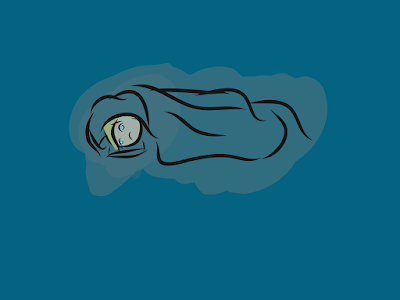Both of my grandmothers lived in town, so during the summer, while Mom was at work, my brothers and I would spend the days with our grandmothers, each on alternate days.
My Grandma H still drove her own car, and while my brothers went out and picked beans and strawberries to earn money (I was never allowed -- "You're a girl," my parents said, because... I don't know), sometimes Grandma H had to go to the store or to the doctor's office.
While she was at the doctor's, of course I'd sit in the waiting room. I always had a library book with me, and there were plenty of Highlights and National Geographic magazines to keep me occupied, avid bookworm that I was. While sitting there absorbed in my reading material, sometimes I was vaguely aware of being watched.
I never thought much about it. I was just passing the time with my books or magazines. Eventually Grandma came out and off we'd go.
Some time later that summer, Grandma said she'd heard from the receptionist that the other elderly ladies in the waiting room had commented on what a good little girl I was. When they saw me left alone in the waiting area, they'd at first thought the worst: I'd run around, make noise, play with toys, and generally annoy them. But instead I sat very still and read silently until the appointment was over. What a good little girl.
Compliments were few and far between when I was that age. My mother firmly "corrected" any deviancy from her notion of The Perfect Girl, my brothers made sure I was reminded daily of their superiority and my inferiority, and Dad had nearly adult expectations of our behavior. But here, oh! here I had a high compliment about things I was really, really good at! I was quiet, I was well-behaved, I was a good reader. I was a good little girl!
Every time after that when I went places with Grandma or any other adult, I was a Good Little Girl with all my might when I had to wait. I was still, I was silent, and I kept myself occupied. I would show everyone just how good I could be.
It wouldn't be long, though, before I discovered how poorly my "talent" for being quiet and making myself practically invisible would serve me anywhere other than a doctor's waiting room in the company of older women with old-fashioned notions.
And I'm not the only one who has learned this painful lesson. In an article in Psychology Today, The Trouble With Bright Girls, author Heidi Grant Halvorson notes that by fifth grade, smart girls are quicker to give up on difficult tasks and yield to the boys because girls believe ability is innate and unchanging, while boys believe that ability is achieved with with effort. Why? Because of the "good girl" trope:
How do girls and boys develop these different views? Most likely, it has to do with the kinds of feedback we get from parents and teachers as young children. Girls, who develop self-control earlier and are better able to follow instructions, are often praised for their "goodness." When we do well in school, we are told that we are "so smart," "so clever, " or " such a good student." This kind of praise implies that traits like smartness, cleverness, and goodness are qualities you either have or you don't.
Boys, on the other hand, are a handful. Just trying to get boys to sit still and pay attention is a real challenge for any parent or teacher. As a result, boys are given a lot more feedback that emphasizes effort (e.g., "If you would just pay attention you could learn this," "If you would just try a little harder you could get it right.") The net result: When learning something new is truly difficult, girls take it as sign that they aren't "good" and "smart", and boys take it as a sign to pay attention and try harder.
In The Confidence Gap, an article from The Atlantic, a similar theme is echoed:
School is where many girls are first rewarded for being good, instead of energetic, rambunctious, or even pushy. But while being a “good girl” may pay off in the classroom, it doesn’t prepare us very well for the real world. As Carol Dweck, a Stanford psychology professor and the author of Mindset: The New Psychology of Success, put it to us: “If life were one long grade school, women would be the undisputed rulers of the world.”And dozens of scholarly articles find the same thing still happens: girls tend to be praised for being quiet and good, boys get praised for doing things.
Now throw a few more things in the mix. I was a born introvert. I'd already been The New Kid In School several times and would be several more times. We were buying an acreage and my parents' time, attention, and finances would soon become entirely wrapped up in house building and starting a small farm, and my brothers and I were used as free labor every weekend. My mother went back to work, and I wasn't allowed to have any friends over or go to anyone else's house after school when my grandmother was watching us and later when I was a latchkey kid. My social skills stagnated, while my emotional needs were just not on anyone's radar.
I was become more and more isolated, with fewer and fewer friends. And my biggest talent for which I got any praise at all was being "good," quiet, and... invisible.

































